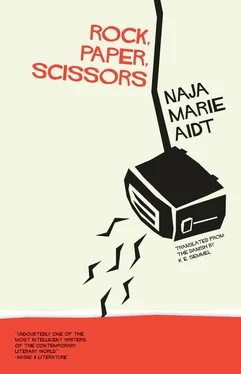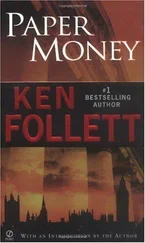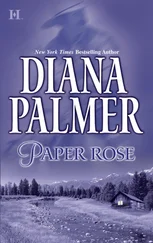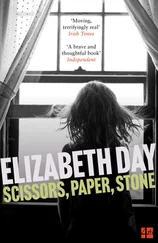When he wakes up with a start the next morning, he doesn’t know whether this was part of the dream or not. Patricia’s making tiny peeping sounds in her sleep each time she exhales. She’s slept on the floor at the foot of the bed, her back to him, the duvet wrapped snugly around her. He gathers his clothes and shuts the door behind him. It’s quarter past 6:00. He sits on the living room floor and begins to research the commercial properties that are for sale. By 7:30 he’s got a good little list. He makes coffee and leans across the kitchen table with his cup. It’s drizzling outside. A tugboat lurches slowly up the river, followed by a few kayaks. From below, a flock of sparrows fly up and settle in an orderly row on the rooftop across the street. The rain sheets the glass with a fine film. Thomas puts his cup in the dishwasher and writes “I love you” in capital letters across the front page of the newspaper. He locks the door on his way out.
It’s not until he’s walking down the stairs toward the train that he understands what he’s done. He can feel a hard knot directly under his breastbone, something unyielding that won’t go away, and of course the soft sense of shame. Patricia’s wide, frightened eyes when she turned to look at him. Her flailing body on the desk. It’s so insurmountable, so incomprehensible and unbearable that he grows sluggish, sleepy. Sitting at the window with his cheek resting against the cold glass, he falls asleep. He rides two stops too far. He walks back along the rain-sopped streets. The asphalt is gleaming and dark. He thinks: The asphalt gleams, dark . The rain picks up as a thunderclap booms off in the distance. The light from the sky is mottled. Looking up, and through a window in a café, he sees someone he recognizes and he stops in his tracks: It’s Jenny, her back to him, talking to Maloney, who raises his mug and blows into it. Thomas lurches to the side, squeezes between the streaked panes of glass. Maloney says something and smiles. He bites into his bun. Jenny turns and regards the rain. Maloney puts his hand on her arm. She’s wearing a green shirt, and a scarf around her neck. The furrows around her mouth are clearly visible. Thomas swallows, holds his breath. Then he hurries past the café and sprints the last stretch to the store. The thunder’s right above him now, the street suddenly illuminated with a violent crack of white light, followed by another boom, very close, the sound exploding in his ears. He jumps, startled, and paws in his jacket for his keys.
Later, Maloney struts through the back door wearing a yellow rain jacket. He’s whistling. By this point Thomas has made several appointments with real estate agents, and before Maloney has hung up his wet jacket, Thomas is out the door carrying Annie’s red and white polka-dotted umbrella. “Whoa, this place is CLEAN!” Maloney calls out. “That niece really worked the elbow grease.”
Monotonously, the rain persists for the rest of the day, and Thomas tours many dismal properties; it’s as though all the life has been sucked from them, or perhaps life has sucked them dry, left them to gather dust. Back rooms yellowed by nicotine. Doors hanging crookedly on loose hinges. Stinking wall-to-wall carpets and small, stuffy bathrooms with rust-caked toilet bowls and leaky tanks. “All it needs is a loving hand,” says the young agent, his tie askew. “It’s quite a find at this price.” Thomas shakes his head and goes outside to smoke. The agent says that he’s got a few more places to show him, none of which were in the newspaper. Then suddenly, in one of the streets from his childhood, at 4:00 P.M., as his belly grumbles with hunger, he steps inside a property that calms his breathing — a long-since closed bookstore where he, as a boy, used to buy his notebooks and sharpen his pencils with the big pencil sharpener the bookseller had installed on the counter. It didn’t cost anything extra. The bookseller wore a gray smock, and his developmentally challenged son either ran errands or sat on a footstool behind the counter, singing. “What was it you said you wanted to buy a place for?” the agent croaks, “office supplies? I don’t want to be a party pooper, but I’m afraid there’s not a huge customer base for that kind of thing in this neighborhood.” Thomas leans against the wall. “There was a video rental here until recently,” the agent says, studying him curiously. “But the owner had a heart attack last summer. The store has been empty for almost a year.”
“Who’s selling it then?”
“His wife, I believe.”
“Can I count on your discretion?”
“Of course,” the agent nods.
“To be blunt, I’d like to pay in cash.”
“Aha.”
“Is that possible?”
“Sure. That shouldn’t be a problem. Between you and me, she’s ready to give the place away, if you know what I mean.” The agent looks at him inquisitively.
“Yeah?”
“Cash settlement. Under the table, in other words.”
“Interesting. And what about your share?”
“We haven’t announced the sale anywhere, so I don’t have any special requirement. Let’s say five percent? Cash?”
“And the paperwork?”
“That can be arranged. But that’ll be in addition.”
“Understood. But I’ll get the deed to the place and all that?”
The agent nods. “Yes, we’ve done this kind of thing before. Or, rather, I have. I run this business by myself.”
“Good,” Thomas says.
The counter’s still there, solid and wide. But the built-in shelves are gone, replaced with a cheap metal variety. A pornographic poster hangs from a single nail and shows an enormous chocolate-brown breast and a pink mouth and tongue. The top of the poster has been torn off, the woman has no eyes. Several posters lie curled up on the floor. Thomas thrusts open the back room door that leads to a large rectangular courtyard with poplar trees and shrubbery. At the far end is a magnolia tree, weighed down by the rain. Here you can see the original floor, uneven planks blackened by too many layers of varnish. “There’s good light in here,” the agent mumbles, glancing at his watch. “I like it,” Thomas says. Except for the counter, there’s nothing special about this place. There’s a humble quality to the rooms; they’re simple, unadorned. Kristin once told him that the reason they purchased the farm was that it had “a good spirit dwelling in it.” He feels there’s one here, too. Thomas listens closely. Rain drums against the glass. The bookseller’s son was named Amando. He used to bite his knuckles whenever he was agitated.
The agent pushes his glasses up. “I’ve heard there was once a pharmacy here. A long time ago.”
“Last time I was here it was a bookstore.”
“Well, I guess it hardly matters now,” the agent says. “Here’s my card. Call me whenever. I’m usually in my car and can come meet you pretty fast.”
Patricia has left a message on his telephone. Her voice, stifling a sob, is angry. She asks him to come home immediately, says that she’s sick. Standing in the rain outside the old bookstore, he watches the real estate agent unlock his car. It’s Wednesday. The agent gets behind the wheel and starts the engine. It’s 5:00 P.M. Thomas lights a cigarette and calls Alice, who answers sleepily. He asks her if she’s interested in working at the store. In the beginning it’ll be just a few weeks, until they see how it’s going. He says that he’s planning to open a branch. She says nothing at first.
“What did you say?”
He explains it again, slowly, painstakingly.
She asks about the salary. He says he needs to do some calculations.
“I did get a job.”
“What did you say?”
“I have a job. I started yesterday.”
Читать дальше












